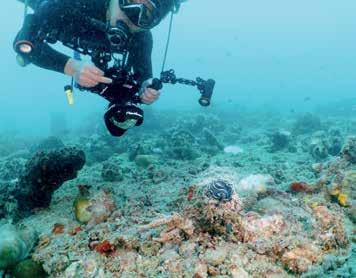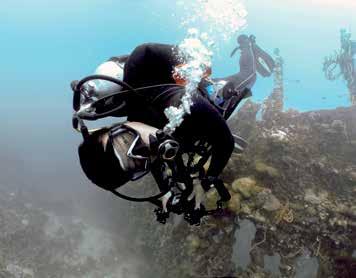
4 minute read
damage it causes
Alumni ‘Reef Defenders’
By Brenda Whately Adrian Chan ’14 Philip Woodhead ’06
While completing his SCUBA Dive Master qualifications in Hong Kong after graduating from UWCSEA in 2014, Adrian Chan was surprised and appalled to learn that blast fishing was still being practiced in many locations around the Asia Pacific region. In Hong Kong, he was told, it had started up again after being completely stopped in 2011. A few months later as he headed off to Sydney Australia to attend the University of New South Wales (UNSW), he had this on his mind. He says, “UWCSEA was a significant part of my development but I feel it gave me a distorted view of the world. I saw the world for how it should be, rather than how it actually is.” At the end of his first year at UNSW, he decided to head back to Hong Kong to instead work for the marine conservation and consultancy company Oceanway, where he had taken his diving lessons and interned, to learn more about blast fishing. He says, “It’s a very destructive method of fishing which kills not only the species being targeted but also the surrounding marine life and habitat. I wanted to find a sustainable way to put an end to it.” Adrian set up his own NGO, Reef Defenders which now operates in Malaysia, Philippines, Hong Kong and Indonesia. Philip Woodhead, another UWCSEA alumnus and scuba diver who also works for Oceanway, soon joined him. Phil graduated from UWCSEA in 2006 and then studied International Relations at Leeds University, UK. He says, “I guess UWCSEA’s mission and values have been instilled into me as I am working in marine conservation and consultancy and with Reef Defenders, trying to eradicate blast fishing for a more sustainable future.” “What attracted me to Reef Defenders was Adrian’s unique way of resolving the blast fishing issue and the clear vision and plan he set out to achieve his goals. Reef Defenders is a group of young divers who have witnessed the destructive effects that blast fishing has on the coral reefs and the marine ecosystem. It is an illegal, non-sustainable and destructive fishing method. Our mission is to eradicate blast fishing in Southeast Asia. Instead of using the traditional method of enforcement however, where the local authorities try to catch and arrest the perpetrators, Adrian observed that most of these fishermen are doing it simply to survive, and whatever is left over, they sell. Many of the blast fishermen are teenagers. The idea of throwing teens in prison is not a satisfactory solution to anything.” Their approach to learning more about the issue included interviewing some of the fishermen. Adrian says, “We used a non-confrontational approach, letting them know that we were not interested in catching them; that we were just interested in learning. Our data collection showed that most of the perpetrators are people who have had few opportunities. Instead
of trying to catch them, we need to come up with alternative ways for them to make a living.” Reef Defenders monitors various sites by performing underwater surveys of the health of the coral and fish populations and installing equipment that measures pressure waves to detect the presence of blast fishing. They collect and record the data and prepare reports to submit to the local authorities. Adrian says, “We were amazed to find that in a 400-square kilometer area in a marine reserve in Malaysia, the detection equipment was recording thousands of blasts every month!” They are already experiencing results. Phil says, “We have been successful in places like the Tunku Abdul Rahman Park and the island of Mabul in Malaysia where we have completely eradicated the problem of blast fishing.” During the first quarter of 2017, Reef Defenders partnered with a Singaporean company, Oceanus Group Limited to integrate their vision of eradicating destructive fishing into Oceanus’ corporate social responsibility program. Oceanus has since integrated sea farmers into their supply chain and have committed to sustainable farming of abalones. Together Reef Defenders and Oceanus are working towards installing sustainable alternative livelihood programs integrating aquaculture, enabling food security and protecting natural resources.
Other successes of Reef Defenders include being featured as part of Discovery Channel’s Frontier Borneo series earlier this year and Adrian’s Excellence Award-winning poster presentation and paper presented in February 2017 at the IEEE/ OES 2017 International Symposium on Underwater Technology held in Busan, Korea, which was subsequently published in April 2017.
Their commitment to the UN Sustainable Development Goals has been realised through a voluntary commitment to the United Nations Ocean Conference which was accepted in June 2017 and published as part of the proceedings of the Conference.
Most recently, in September 2017, Adrian along with Oceanway Corporation’s director, presented at the Maritime Enforcement Security Workshop hosted by the US Pacific Command in Kota Kinabalu. From this interaction, Adrian says, “Three mother ships identified as carrying out destructive fishing practises have since been detained by the relevant authorities without any cost to life or child imprisonment.” For more information about Reef Defenders, please visit their website https://thereefdefenders.org and/or their Facebook page, https://www.facebook.com/ ReefDefenders.
Two UWCSEA alumni are working to implement sustainable options in place of destructive blast fishing.












